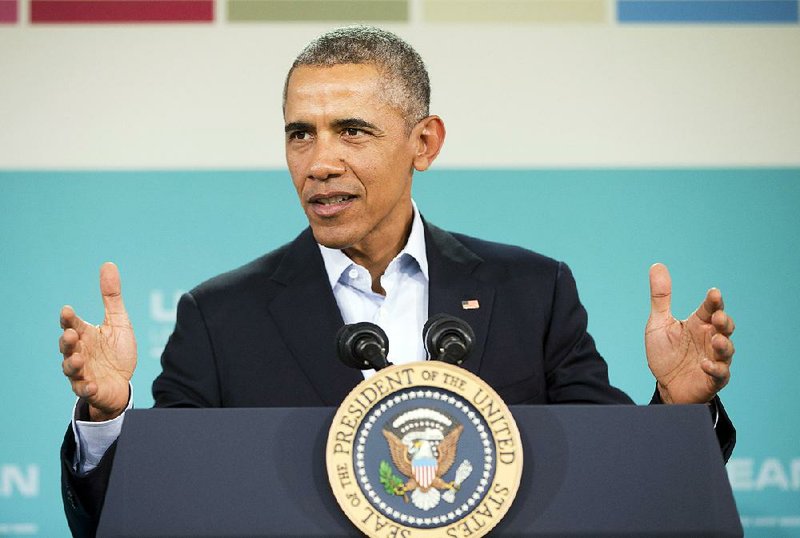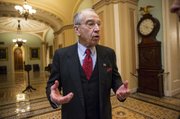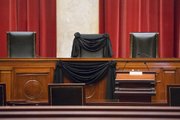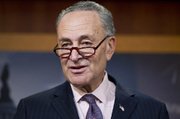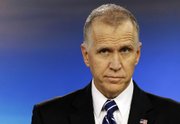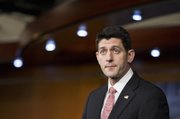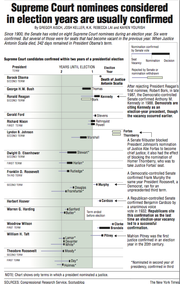WASHINGTON -- The chairman of the Senate Judiciary Committee is leaving open the possibility of traditional confirmation hearings for President Barack Obama's choice to fill a Supreme Court vacancy after the death of Antonin Scalia.
RELATED ARTICLE
http://www.arkansas…">Call to sort sea strife ends summit
Sen. Charles Grassley, R-Iowa, said he backs Majority Leader Mitch McConnell's view that Obama's successor should make the nomination of the justice. But Grassley didn't rule out holding confirmation hearings and a vote by his panel on an Obama selection.
"I would wait until the nominee is made before I would make any decision," Grassley said Tuesday in a conference call with Iowa radio reporters. "In other words, take it a step at a time."
He added: "This is a very serious position to fill, and it should be ... debated during the campaign and filled by either Hillary Clinton, Sen. Sanders or whoever's nominated by the Republicans."
Obama said at news conference Tuesday in California that the Constitution requires the Senate to consider his nominee, and he cast Republican leaders' initial refusal to do so as a test of "fair play."
"The Constitution is pretty clear about what is supposed to happen now," Obama said on the sidelines of a conference with the Association of Southeast Asian Nations. "Historically, this has not be viewed as a question. There's no unwritten law that says it can only be done in off-years; that's not in the Constitution."
Obama added that he will pick someone who "indisputably is qualified" to replace Scalia.
"I intend to do my job between now and Jan. 20 of 2017," Obama said at a news conference. He said of the nation's senators, "I expect them to do their job as well."
He said the Senate's willingness to hold hearings and vote on his nominee will be "a test" of "whether or not norms, rules, basic fair play can function at all in Washington these days."
"I'm amused when I hear people who claim to be strict interpreters of the Constitution suddenly reading into it a whole series of provisions that are not there," Obama said.
pressure from democrats
Senate Republicans, led by McConnell and including GOP senators -- including Grassley -- who are up for re-election this year, said Election Day in November will give voters a say in who replaces Scalia.
But Democrats quickly seized on Grassley's remarks as evidence of what they think will be mounting pressure on Republicans to at least hold hearings on any nominee Obama brings forward.
"Sen. Grassley's statement indicates that our Republican colleagues are moving, as they must eventually, toward obeying the Constitution in holding hearings and a vote on the president's Supreme Court nominee," said Sen. Richard Blumenthal, D-Conn. and a member of the Judiciary Committee.
Senate Democrats said that Obama has every constitutional right to make the selection and the Senate should do its job and consider the choice.
Obama has said he will nominate a replacement in due time. His Democratic allies made clear that denying the president that right would be an unprecedented step and argued it would enshrine the GOP as "the most nakedly partisan, obstructionist and irresponsible majority in history."
"By ignoring its constitutional mandate, the Senate would sabotage the highest court in the United States and aim a procedural missile at the foundation of our system of checks and balances," Senate Minority Leader Harry Reid, D-Nev., wrote Tuesday in a op-ed in The Washington Post.
The No. 3 Democrat in the Senate, Charles Schumer of New York, said Tuesday that he expects Obama to select a consensus candidate who could get bipartisan support and predicted that a "huge public outcry" would force McConnell to back down.
"When the hard right doesn't get its way, their immediate reaction is 'Shut it down' -- and the Republican leadership marches in lock step," Schumer said in a statement. "They will have to back off this extreme, partisan stance."
Sen. Thom Tillis, R-N.C., a member of the Judiciary Committee, cautioned Republicans on Tuesday against flatly ruling out any Obama nominee because of the possibility that the president selects someone who matches Scalia's conservative views.
"That's unlikely to happen, but I think we fall into the trap if we just simply say 'Sight unseen,' we fall into the trap of being obstructionist," Tillis said on The Tyler Cralle Show on WAAV in Wilmington, N.C.
Tillis said that if Obama picks a candidate who embraces the president's views, "then we'll use every device available to block that nomination, wait till the American people voice their vote in November and then move forward with the nomination after the election."
Republican Sens. Rob Portman of Ohio, Ron Johnson of Wisconsin and New Hampshire's Kelly Ayotte -- vulnerable incumbents -- echoed McConnell.
Sen. Ted Cruz, the Texan who has practiced before the high court and is seeking the Republican presidential nomination, has vowed to filibuster any nominee.
Senate Republicans have the numbers to block any nominee.
Republicans outnumber Democrats 11-9 on the Judiciary Committee, which would hold confirmation hearings and vote on whether to send the nominee to the full Senate.
The GOP holds the majority, 54-46, and Democrats face the task of trying to get 14 Republicans to join them in breaking a filibuster.
Other Republicans feared the spectacle of Supreme Court hearings in the middle of an unpredictable presidential campaign.
"Most every Republican has to feel like in this really robust election year with all the fighting and back and forth going on, that this is not the time to have a battle over a Supreme Court nominee," Sen. Orrin Hatch, R-Utah and a senior member of the Judiciary Committee, told NPR on Tuesday.
Control of the Senate is at stake this election and Democrats looking to unseat Portman and Sen. Pat Toomey of Pennsylvania -- along with Ayotte and Johnson -- have seized on their call to wait until next year.
In a fundraising appeal, Ohio Democrat Ted Strickland said Portman "has a clear choice to make: He can look out for his party and D.C. special interests by holding back President Obama's nominee, or he can do his job for the people of Ohio."
House Speaker Paul Ryan, R-Wis., whose chamber plays no formal role in the process, backed McConnell on Tuesday. He told the Milwaukee Journal Sentinel that Republicans would be justified in not filling a Supreme Court vacancy "knee deep into a presidential election."
In Iowa, Grassley is running for re-election in November, for a seventh term.
Asked Tuesday whether he thought the debate over filling the court vacancy might endanger his chances this fall, Grassley said, "I think I have a responsibility to perform and I can't worry about the election. I've got to do my job as a senator, whatever it is. And there will be a lot of tough votes between now and the next election."
Grassley found himself the subject of criticism on the editorial pages of the state's largest newspaper, The Des Moines Register. "This could have been a 'profile in courage' moment for Senator Grassley," the paper wrote in an editorial published before Grassley spoke Tuesday. "This was an opportunity for our senior senator to be less of a politician and more of a statesman. It was a chance for him to be principled rather than partisan."
In a statement after Scalia's death Saturday, Grassley had said that the government should "defer to the American people who will elect a new president to select the next Supreme Court Justice."
But in 2008, Grassley himself argued against delays in the consideration of President George W. Bush's judicial nominees by the Senate, then controlled by Democrats.
High court mourns
Scalia died unexpectedly Saturday at age 79 while staying at a west Texas ranch. He joined the court in 1986 and was its longest-serving justice.
In Washington, Scalia's courtroom chair was draped in black to mark his death, a Supreme Court tradition that dates to the 19th century.
Court officials also draped black wool crepe over the entrance to the marble courtroom and the mahogany bench in front of Scalia's chair. Flags on the court's front plaza will be flown at half-staff for 30 days.
The court is expected to resume hearing cases Monday.
Court officials announced that Scalia's body will lie in repose Friday at the Supreme Court, followed by a funeral service Saturday at the Basilica of the National Shrine of the Immaculate Conception, the nation's largest Catholic church.
Scalia's casket will be on public view in the court's Great Hall on Friday, court officials said, after a private ceremony in the morning.
Current and retired justices are expected to line the marble steps as the casket is carried through the court's main entrance, below the inscription "Equal Justice Under Law."
Burial plans have not been released, but court spokesman Kathy Arberg said it would be closed to media coverage.
Deep background checks
As Obama begins musing over potential nominees, White House lawyers are scouring a life's worth of information about his picks, from the mundane to the intensely personal.
Prospective justices are put through the nation's most thorough background check, an invasive process where nothing is off-limits. After all, a surprise dredged up later could scuttle confirmation. So candidates' taxes, writings, childhoods, business dealings, medical histories and love lives are all scrutinized for potential red flags.
"The idea that you miss something that later torpedoed the nomination -- that's a nightmare," said Jack Quinn, former White House counsel to President Bill Clinton.
Just ask appeals court Judge Douglas Ginsburg. Nine days after President Ronald Reagan nominated him for the high court, it was revealed he had smoked marijuana as a law professor at Harvard and he was forced to bow out.
Traditionally, vetting takes weeks if not months, depending on how many candidates are being checked. But Obama is expected to move as quickly as possible to announce his pick.
The White House was jolted into action after learning of Scalia's death, officials said, summoning administration lawyers over Presidents Day weekend to begin searching for a suitable replacement. Obama has been working with top advisers on his list while aides feel out senators about their willingness to hold a vote.
Millions of Americans with security clearances or government jobs are asked probing questions about their loyalty, reliability and character in FBI background checks. But for Supreme Court contenders, the inquiry goes far deeper.
Justice Anthony Kennedy sat through 10-plus hours of FBI interviews -- and a three-hour session with the attorney general and White House counsel in which all "conceivable no-holds-barred questions were asked," according to a memorandum archived in the Reagan Library.
Obama, like the four most recent presidents before him, tends to interview his final candidates himself. George W. Bush interviewed five candidates to replace Sandra Day O'Connor before settling on Samuel Alito, according to the Congressional Research Service.
After the president's nomination there's a whole new round of questioning -- this time by the Senate Judiciary Committee, in questionnaires and finally in televised hearings. Justice Sonya Sotomayor, nominated in 2009, was asked whether anyone in Obama's office had asked her about cases currently before the court. She also was asked to list every opinion she'd written, every time she'd recused and every legal event she'd attended since joining the district court.
All told, Sotomayor's questionnaire response totaled more than 5,000 pages.
Information for this article was contributed by Donna Cassata, Alan Fram, Lisa Rathkel, Josh Lederman, Kathleen Hennessey, Robert Burns and Sam Hananel of The Associated Press; by Jennifer Steinhauer of The New York Times; and by Mike Dorning of Bloomberg News.
A Section on 02/17/2016
